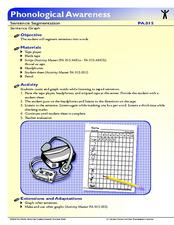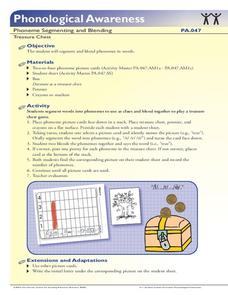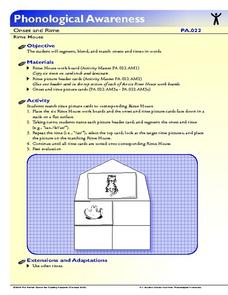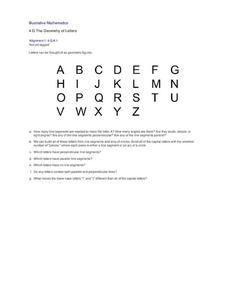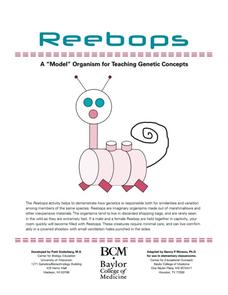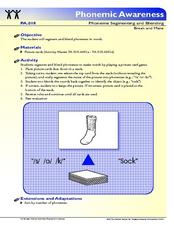Florida Center for Reading Research
Phonological Awareness: Sentence Segmentation, Sentence Graph
Young scholars segment sentences while they listen to a series of sentences. Using a graph, pupils make a mark for each word they hear. Learners listen to each sentence three times; once to listen, once to mark, and once to check their...
Florida Center for Reading Research
Treasure Chest
Segmenting and blending phonemes helps budding readers understand words. Use this strategy in an engaging game where partners test each other's auditory processing using familiar words. Using picture cards and a chart (included),...
Florida Center for Reading Research
Phoneme Challenge
This phonemic awareness game is very similar to the classic card game war; partners divide picture cards, each taking half (included). They place one card face-up at a time and segment the phonemes aloud. Whoever has the most phonemes...
Florida Center for Reading Research
Sound Spin
Here is a phoneme segmenting game which incorporates drawing for your more artistic learners. Assemble the spinner using a brad and lay out the picture cards face up. Partners take turns spinning to get either two, three, four, or five....
Florida Center for Reading Research
Phoneme Feud
This is a phoneme feud! A literacy game that is very similar to the classic card game War! has partners challenging each other for the most phonemes. They place one picture card face-up at a time and segment the phonemes aloud. Whoever...
Florida Center for Reading Research
Phonological Awareness: Sentence Segmentation, Nursery Rhymes
What makes a complete sentence? Words, of course! As your budding readers understand this relationship, guide them through this nursery rhyme activity. Scholars examine pictures of 10 familiar rhymes, mentally counting the words in the...
Florida Center for Reading Research
Phonological Awareness: Phoneme Segmenting, Say and Slide Phonemes
Develop phonological awareness using this partner activity, where scholars segment words into phonemes. Using Elkonin Box picture cards, pairs practice orally segmenting sounds and physically representing the phonemes using counters....
Florida Center for Reading Research
Phonological Awareness: Onset and Rime, Rime House
Are you covering onset and rime with budding readers? Here, learners examine six "rime house" work boards, each with an image at the top. Working with a partner, they segment each top image's onset and rime. Then, they pick cards and...
Florida Center for Reading Research
Phonological Awareness: Phoneme Segmenting, The Sound Game
Pre-readers get a better understanding of phoneme segmenting and counting by playing a board game. They pick an image card from the stack, say the name of the object, break the word down into segments, then move their piece that number...
Florida Center for Reading Research
Phonological Awareness - Phoneme Segmenting and Blending, Treasure Chest
Working in pairs, scholars use picture cards to practice segmenting words into phonemes and blending phonemes into words. When a peer answers correctly they place a penny in a treasure chest. Incorrect responses make the card go back in...
Florida Center for Reading Research
Phonological Awareness: Onset and Rime, Quick Pick
What does it begin with? In this engaging phonics game, small groups study onset and rime using picture cards. Groups take turns as one player draws three cards from an overturned pile, placing them face-up on the table. They silently...
Illustrative Mathematics
Placing a Fire Hydrant
Triangle centers and the segments that create them easily become an exercise in memorization, without the help of engaging applications like this instructional activity. Here the class investigates the measure of center that is...
101 Questions
Best Midpoint
Develop a strong understanding of what it means to be a midpoint. Learners analyze the angles, coordinates, and lengths of segments and their approximated midpoints. They use their analyses to develop a formula to rank four attempts at...
Illustrative Mathematics
Shortest Line Segment from a Point P to a Line L
One of the hardest skills for many young geometers to grasp is to move beyond just declaring obvious things true, and really returning to fundamental principles for proof. This brief exercise stretches those proving muscles as the...
Florida Center for Reading Research
Picture Slide
Here is another fun and engaging way to help youngsters build phonological awareness. In pairs, they use the provided picture cards to sound out segments of words. As they slide the picture together they say a segment of the...
Illustrative Mathematics
The Geometry of Letters
Use the alphabet as a tool for teaching your class about geometric figures. Break apart capital letters into line segments and arcs. Classify angles as right, acute, or obtuse. Identify parallel and perpendicular lines. An excellent...
Florida Center for Reading Research
Syllable Hopscotch
Let your little learners move while they practice breaking words into syllables or chunks. Place a hopscotch "board" on the floor (this can be done with tape). Your class takes turns choosing picture cards, and then they say the name of...
National Council of Teachers of Mathematics
Stitching Quilts into Coordinate Geometry
Who knew quilting would be so mathematical? Introduce linear equations and graphing while working with the lines of pre-designed quilts. Use the parts of the design to calculate the slope of the linear segments. The project...
Baylor College
Reebops: A “Model” Organism for Teaching Genetic Concepts
In a sweet simulation, junior geneticists examine the chromosomes of a fictitious Reebop marshmallow animal, combine chromosomes to produce offspring, and then make a model of the resulting Reebop baby. Phenotypes include number of...
Illustrative Mathematics
Points equidistant from two points in the plane
Young geometers apply their deductive reasoning skills and knowledge of proving triangles congruent in a task that asks them to prove if a point lies on the perpendicular bisector of a segment, then it is equidistant from the endpoints...
Florida Center for Reading Research
Phonemic Awareness: Phoneme Segmenting and Blending, Break and Make
Young learners build phonemic awareness and strong phoneme blending skills. Pairs guess the image on the card based on the word segment sounds given by blending what they hear.
Florida Center for Reading Research
Phonological Awareness: Phoneme Blending, What's My Word?
At a listening station, learners listen to a pre-recorded script; they follow the directions and number each picture on their picture chart corresponding to the segmented phonemes they hear.
Florida Center for Reading Research
Phonemic Awareness: Phoneme Segmenting, The Phoneme Game
Early readers play a board game to practice segmenting phonemes. Players determine how many spaces to move by choosing a picture, saying the object's name on the card, then counting the phonemes they say.
Florida Center for Reading Research
Phonics: Onset and Rime, Change-A-Word
Kids use their phonological know-how to identify and segment onset and rime blends. Double rime picture cards (cat and hat) are chosen, then matched to onset cards that make each word, such as the k sound for a cat and the h sound for a...
Other popular searches
- Line Segments
- Phoneme Segmentation
- Geometry Lines Line Segments
- Segmented Worms
- Segment Addition Postulate
- Line Segments Rays
- Syllable Segmentation
- Perpendicular Line Segments
- Congruent Line Segments
- Proportional Segments
- Lines and Line Segments
- Market Segmentation
